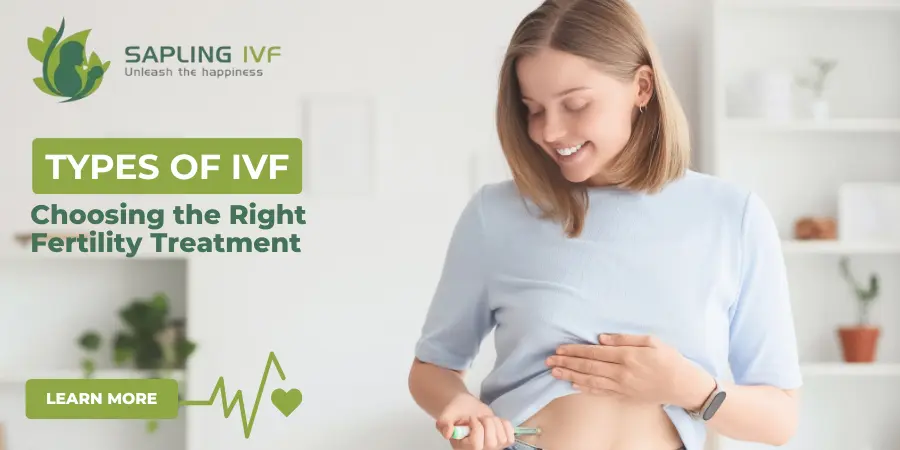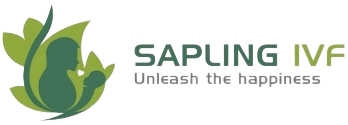Types of IVF: Choosing the Method That Fits Your Story

When couples start their fertility journey, one of the most common questions they have is, what are the different types of IVF, and which one is right for us? Understanding the types of IVF helps you make an informed, confident, and personalized decision that aligns with your medical, emotional, and financial needs.
At Sapling IVF, we believe every parenthood story is unique, and so should be the fertility treatment plan. Let’s explore the various types of IVF treatments available today and how they help different individuals and couples achieve their dream of conception.
What Is IVF and Why It’s Not the Same for Everyone
In Vitro Fertilization (IVF) is a process where an egg and sperm are combined outside the body, and the resulting embryo is transferred into the uterus. While the basic steps remain the same, IVF techniques have evolved with technology, offering specialized methods to address different fertility challenges, from egg quality and sperm count to genetic conditions.
Each type of IVF is designed to improve success rates depending on the underlying cause of infertility.
To understand how the procedure works in detail, read our comprehensive guide on the test tube baby process steps.
Types of IVF Treatments
Below are the major types of IVF treatments performed across fertility centers today, each suited for specific medical conditions and fertility goals.
1. Conventional IVF
This is the most common and widely performed form of IVF. It involves:
Ovarian stimulation through hormonal injections
Egg retrieval from the ovaries
Fertilization in a lab
Embryo transfer to the uterus
Best for:
Couples with unexplained infertility, mild male factor infertility, or long-term unsuccessful natural conception attempts.
Advantages:
High success rates per cycle
Suitable for a wide range of fertility issues
2. Natural Cycle IVF
Unlike conventional IVF, Natural IVF uses no or minimal medication to stimulate the ovaries. It relies on the natural selection of one dominant egg per cycle.
Best for:
Women with low ovarian reserve
Those sensitive to fertility medications
Couples preferring a natural approach
Benefits:
Lower cost
Reduced risk of ovarian hyperstimulation
More comfortable for patients
However, as only one egg is retrieved, the success rate per cycle is lower than stimulated IVF.
3. ICSI (Intracytoplasmic Sperm Injection)
ICSI is a breakthrough in assisted reproduction, often recommended for male infertility cases. A single healthy sperm is directly injected into an egg using a microscopic needle, ensuring higher fertilization chances.
Best for:
Low sperm count or motility
Poor sperm morphology
Previous failed fertilization in standard IVF
Learn more about how eggs are retrieved for ICSI and other IVF cycles in our IVF egg retrieval day guide.
4. Donor Egg IVF
In Donor Egg IVF, eggs from a healthy donor are fertilized with the partner’s or donor’s sperm. This option is ideal when the female partner has diminished ovarian reserve or genetic issues.
Best for:
Women over 40 with poor egg quality
Premature ovarian failure
Hereditary genetic conditions
Advantages:
Higher success rates
Genetically healthy embryos
Note: Donor selection and matching are handled with utmost confidentiality and ethical care at reputable fertility centers like Sapling IVF.
5. Frozen Embryo Transfer (FET)
In a Frozen Embryo Transfer, embryos from a previous IVF cycle are frozen and transferred later in a carefully timed cycle.
Best for:
Couples preferring flexibility between retrieval and transfer
Those recovering from overstimulation
Genetic testing candidates
Benefits:
Less physically demanding
Allows genetic screening before transfer
Comparable success rates to fresh transfers
6. Assisted Hatching IVF
Some embryos may struggle to “hatch” from their outer shell before implantation. In Assisted Hatching, a tiny opening is made in the embryo’s outer layer to aid successful implantation.
Best for:
Women above 37
Previous IVF failures
Thick zona pellucida (outer shell)
This technique can significantly increase implantation chances for specific cases.
7. Mini IVF (Mild Stimulation IVF)
Mini IVF uses fewer medications compared to conventional IVF, stimulating the ovaries to produce fewer but higher-quality eggs.
Best for:
Women with low ovarian reserve
Patients seeking a less intensive treatment
Advantages:
Lower medication cost
Reduced hormonal side effects
More natural ovarian response
8. Preimplantation Genetic Testing (PGT) with IVF
PGT allows embryologists to test embryos for genetic abnormalities before transfer. This ensures only chromosomally normal embryos are implanted.
Best for:
Couples with genetic disorders
Recurrent miscarriages
Older maternal age
External Reference: According to the World Health Organization (WHO), around 17.5% of adults globally experience infertility, and advanced IVF technologies like PGT are helping improve safe pregnancy outcomes.
How to Choose the Right Type of IVF for You
The ideal type of IVF depends on multiple factors:
Age and ovarian reserve
Cause of infertility (male/female factor)
Previous fertility history
Medical conditions and hormone levels
Personal comfort and emotional readiness
A fertility specialist will evaluate these parameters before suggesting the most suitable IVF technique.
Tip: Always seek clinics with transparent success rates, advanced embryology labs, and experienced fertility specialists.
For more clarity, you can explore the IVF treatment services offered at Sapling IVF to understand which method aligns best with your needs.
The Future of IVF Treatments
Fertility science is advancing rapidly, from time-lapse embryo imaging to AI-based embryo selection, and even 3D culture systems. Clinics that integrate these technologies are leading the next generation of IVF success.
According to Mayo Clinic, the combination of personalized treatment planning and cutting-edge techniques plays a crucial role in improving conception rates and reducing complications.
Final Thoughts
Your IVF journey is deeply personal, and so should be your treatment plan. Whether you opt for Natural Cycle IVF, ICSI, Donor Egg IVF, or PGT-based IVF, the right choice is one that aligns with your body, your goals, and your story.
At Sapling IVF, our experts combine medical excellence with empathy to design individualized fertility solutions, helping you take confident steps toward parenthood.
For expert care and advanced fertility solutions in Delhi NCR, visit Sapling IVF — where science meets compassion, and every story begins with hope.
Frequently Asked Questions (FAQs)
The Conventional IVF method usually offers the highest success rate, especially for women under 35 with healthy ovarian reserve and no severe male infertility issues. However, success also depends on factors like embryo quality, uterine health, and clinic expertise. Advanced procedures such as ICSI or PGT (Preimplantation Genetic Testing) can further improve results in specific cases. For best outcomes, consult an experienced fertility team like Sapling IVF, where treatment is personalized to your unique reproductive profile.
For women aged 40 and above, Donor Egg IVF or PGT-A tested embryo transfers are often the most effective. Age-related egg quality decline affects natural conception and traditional IVF success rates. Using donor eggs from younger women or genetically screened embryos significantly increases pregnancy chances and reduces miscarriage risk. A fertility expert will evaluate ovarian reserve, hormone levels, and medical history before recommending the best IVF approach.
Natural Cycle IVF uses little to no medication and retrieves the naturally selected egg of that cycle, while Conventional IVF stimulates multiple eggs through hormonal injections. Natural IVF is ideal for women who prefer a gentle, medication-free approach or have low ovarian reserve. However, Conventional IVF usually offers higher success per cycle due to more embryos being available. The right choice depends on your health, comfort, and fertility goals — a discussion best had with a specialist at Sapling IVF.
The right type of IVF depends on several factors:
Your age and ovarian reserve
The cause of infertility (male, female, or unexplained)
Any previous IVF or pregnancy history
Your response to hormonal stimulation
A fertility expert will conduct detailed tests — including AMH, semen analysis, and ultrasound — before recommending the best IVF type, such as ICSI for male factor, Donor Egg IVF for low reserve, or FET for flexible timing. At Sapling IVF, your plan is customized to your unique story.
Yes, all medically approved types of IVF are generally safe when performed at licensed fertility centers following global protocols. While minor side effects like bloating or mood changes can occur, serious complications are rare. Techniques such as mild stimulation IVF, FET, and Assisted Hatching are designed to make IVF gentler and safer for patients. Choosing a reputed fertility clinic with experienced embryologists and transparent success data, like Sapling IVF, ensures both safety and effectiveness throughout your journey.

